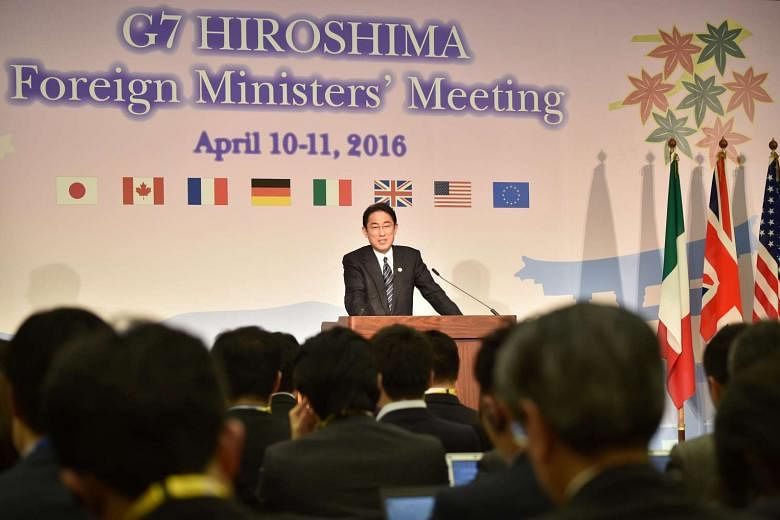HIROSHIMA • Foreign ministers from the Group of Seven (G-7) advanced economies said they strongly opposed provocation in the East and South China Seas, where China is locked in territorial disputes with nations including the Philippines, Vietnam and Japan.
"We are concerned about the situation in the East and South China Seas, and emphasise the fundamental importance of peaceful management and settlement of disputes," the ministers from the United States, Japan, Britain, Germany, Canada, France and Italy said in a joint statement yesterday at the end of a two-day meeting in Hiroshima.
"We express our strong opposition to any intimidating, coercive or provocative unilateral actions that could alter the status quo and increase tensions, and urge all states to refrain from such actions as land reclamations, including large-scale ones, building of outposts, as well as their use for military purposes," the statement said.
In an apparent reference to China's territorial spat with the Philippines, the group also called on countries to observe international maritime laws and implement any binding judgments delivered by courts and tribunals.
Manila has asked the International Court of Arbitration in The Hague to decide on its dispute with Beijing, which has said it does not recognise the case. A ruling is expected by June.
China is building islands on reefs in the South China Sea to bolster its claims to more than 80 per cent of the waters. Brunei, Malaysia, the Philippines, Taiwan and Vietnam also have claims on the waters, which are believed to have huge deposits of oil and gas.
Japan is also engaged in its own dispute with China in the East China Sea over a chain of uninhabited islands administered by Japan.
Ships from the two countries regularly tail each other near the islets known as Senkaku in Japanese and Diaoyu in Chinese.
"The G-7 is going through the motions of making it clear to China that if they do something more there will be a cost to bear," said Dr Malcolm Davis, a senior analyst at the Australian Strategic Policy Institute in Canberra.
Any attempt to get a similar statement from the United Nations would be blocked by China, which is a member of the Security Council.
"The G-7 statement is probably the best the Americans can get at this stage," Dr Davis said.
China said it had not seen the G-7 statement, but that countries in the region were seeking to promote stability and that disputes were being "exaggerated".
"If the G-7 wants to continue playing a major role in the world, it should take an attitude of seeking truth from the facts to handle the issues the international community is most concerned with at the moment," Chinese Foreign Ministry spokesman Lu Kang told a daily news briefing.
"If the G-7 is taken hostage by the selfish interests of certain countries, then this probably won't be beneficial to the G-7's influence, role and future development."
BLOOMBERG, REUTERS

